Speakers
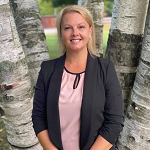
Jessica Anderson
Executive Director, North Hastings Children's Services
Ms. Anderson is the Executive Director of North Hastings Children‘s Services (NHCS). As the central provider of licensed educational, social, family and child services to 7 municipalities, NHCS partners with the local Algonquin First Nation and over 20 agencies to enhance the wellbeing of children and families. Ms. Anderson has a professional background in corporate, government and non-profit agencies, and a proven track-record in organizational change, program integrity, operational effectiveness, finance, legislative compliance, regulations, policies and reporting. She has served on the Quinte Health Care Board of Directors, as well as a key member of several health and family advisory boards, including: the Bancroft Family Health Team Board, former Quinte Health Care Advisory Council member; Loyalist College Early Childhood Education Advisory Board; Hastings and Prince Edward (HPE) Children and Youth Services Network Planning Table; HPE Service Navigation Committee; HPE Indigenous Children and Youth Services Planning Table, HPE Early Years Advisory Committee, North Hastings Community Safety and Wellbeing Advisory, Intersections Oversight Committee and the Children and Youth Mental Health and Addictions Service Provider Group. 
Chantelle Bryson
Municipal and Indigenous Lawyer
Chantelle is a sole practitioner with two decades of experience working with municipalities, First Nations and related institutions in the areas of good governance, Indigenous and human rights, labour and employment, land use planning and environmental law, and general administrative law before a variety of tribunals and all levels of court.
Most recently, Chantelle was a Member of the Ontario Municipal Board and counsel to the Office of the Provincial Advocate for Children and Youth at the Seven Fallen Feathers Inquest in Thunder Bay, Ontario.
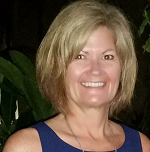
Chief Laurie Carr
Hiawatha First Nations
Waawaakeshi Dodem, Mgizi Kwe Ndishnikaz, Laurie Zhagaanosh Nooswin, Hiawatha Ndoonjaba, Michi saagiig Anishinawbee Ndaaw, Giimaa
Laurie is from the Deer Clan, her Indigenous name is Eagle Woman, her English name is Laurie, she is Michi Saagiig from Hiawatha First Nation and the Chief of the Community.
Laurie come’s from a long line of political leaders on both sides of her family. Her mother’s family, the Paudash’s, were the hereditary Chiefs of Hiawatha. When the Indian Act election process came into effect, Laurie’s paternal side of the family, the Cowie family, had several elected Chiefs for Community, including her father, Frank Cowie, who was Chief for 18 years.
Not only is this way of life in her bloodlines, but she grew up absorbing and observing the life of a Chief. All along she was being taught and not knowing this at the time, but it was all part of her path, her journey forward to serve her First Nation.
In 2004 Laurie was elected as a member of the Hiawatha Council and served for 3 years. In 2007, she was elected as Hiawatha’s first female Chief and served until 2010. From 2010 to 2017 Laurie worked at the Chiefs of Ontario as the Southern Ontario Non-Insured Health Benefits Navigator and 1 year as the Acting Social Director for the First Nations in Ontario. In 2017 Laurie was re-elected as Chief and continues to serve her First Nation in this role.
In her role as Chief, Laurie’s responsibilities include: Intergovernmental Affairs; Negotiations; Core Consultation; Legal/Financial matters; Political matters; Williams Treaties and other Treaty Relations; and Policing. Laurie is also the Chairperson for the Dnaagdawenmag Binnoojiiyag Child & Family Services (DBCFS). Through Hiawatha’s Provincial Territorial Organization (PTO), the Association of Iroquois and Allied Indians (AIAI), Laurie sits on their Chief’s Council and holds the Portfolio for Social and as an alternate for the Health Portfolio.
Laurie states her best life is to live with purpose guided by our Seven Granfather Teachings of Wisdom/Nbwaakaawin, Love/Zaagidiwin, Respect/Mnaadendamowin, Bravery/Aakdehewin, Honesty/Gwekwaaziwin, Humility/Dbadendizwin and Truth/Debwewin, and as she lives her best life, and serves her First Nation, she could not do this without the encouragement, love and support of her family and Community.

Isadore Day
Chief Executive Officer, Bimaadzwin
Isadore Day is the former Chief of Serpent River First Nation and a former Ontario Regional Chief over the span of 15 years involved in First Nation leadership. Isadore was the Chair of the Assembly of First Nations‘ Chiefs Committee on Health and established the AFN Task Force on Cannabis.
He is the Founder and CEO of Bimaadzwin where his main focus is on Nationhood rights and Sovereignty; and specifically, the improvement in First Nation health, social, economy conditions of current and future generations. Isadore is emphatic that the Indian Act is colonial oppression and at the root of what must change in all First Nations – he vows to maintain and refine his life‘s mission to be focused on reconstituting Indigenous Nations on Turtle Island. He works with all levels of government and industry, as well as numerous associates to ensure the economic development and autonomy of First Nations.
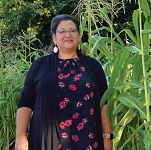
Jennifer Dockstader
Executive Director, Fort Erie Friendship Centre & OFIFC President
Jennifer is from the Oneida of the Thames Nation, Bear Clan, and a citizen of the Haudenosaunee Confederacy. She is a strong believer in her people, her Indigenous traditions, and that there is no higher honor than to be of service to the people.
Jennifer graduated from Buffalo Academy of Visual and Performing Arts as the top music student with a Major in Vocal Music. Jennifer went on to achieve an advanced degree in Psychology from Temple University with a specialization in Addiction and Childhood Sexual Abuse.
Jennifer has worked with her Indigenous community for over 30 years to help people become stronger and healthier. She has served as President of Niagara Chapter Native Women Inc., President of Survivor‘s House of Hope, and President of the Fort Erie Native Friendship Centre. She is the President of the Board of Directors for the Ontario Federation of Indigenous Friendship Centres.
Jennifer is the Executive Director for the Fort Erie Native Friendship Centre. Starting this role in 2014, she has worked to facilitate local paradigm shifts about Indigenous people and build a stronger community. She believes in the Vision and Mission statement of the Organization To Enhance All Aspects of Native Life While Extending Friendship to the Community and Together for a Stronger Tomorrow. A proud mother, Auntie, daughter, sister, granddaughter and friend Jennifer believes in the strength of women no matter which role they take in society.

Ken Doherty
Principal Consultant, Our Heritage Consulting
Since his retirement, Ken has consulted with Not-For-Profit organizations, small businesses, municipalities and related associations on governance, organizational development, business plans, First Nations relations, strategic planning, cultural planning/ mapping, and report writing. He is also a regular contributor to Ontario Out of Doors.
Originally an aspiring history teacher, Doherty brings 38 years of municipal experience as: Museum Curator and Director, Library CEO, and finally as Director of Community Services for the City of Peterborough. Throughout his career, Ken presented at conferences, workshops, and university/ college classrooms on municipal support of culture, museum studies, community partnerships, First Nations relations/ repatriation, Age-Friendly communities, Municipal Government 101, and Sustainability.
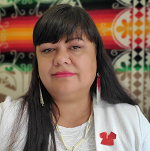
Gahnegiyohs:ta Shelly Hill, MA Lead
Six Nations, Ontario, Manager, Indigenous Relations, City of Hamilton
Shelly is from Six Nations of the Grand River, Ontario. She has worked and lived in the urban communities most of her career obtaining a Master of Arts (M.A.) Degree focused on Leadership from Trinity Western University, BC. Her experience reflects a bicultural and mainstream perspective keeping her traditional Longhouse teachings close to heart. Innovative and adaptive, she has served on various Board of Directors and has been a key advocate working for Indigenous peoples with the guidance from Elders, Knowledge Keepers and community members in the non-profit industry for more than 30 years working mainly in the urban Indigenous sectors.
Shelly works with the City of Hamilton leading the implementation of Hamilton’s first Urban Indigenous Strategy responsible for building relationships with the community Indigenous leaders and individuals, promoting Indigenous cultures and programs, engaging the broader Hamilton community and treaty territories, collaborating with various Indigenous organizations, advancing public education initiatives, facilitating city-wide community dialogue and advancing the recommendations of the 2015 Truth and Reconciliation Commission Report, Calls to Action and the Missing and Murdered Indigenous Women and Girls, Calls to Justice at the local level.
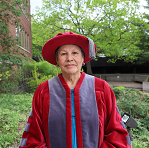
Photo courtesy of Algoma University
Elder Shirley Horn
Known for her significant advocacy work, Shirley Horn has worked tirelessly for her people. She co-founded the Children of Shingwauk Alumni Association in 1981, an organization that has been a leader on the national level about the issue of residential schools. Horn was Chief of her own community, the Missanabie Cree First Nation for 10 years, and has also been a member of the Missanabie Cree Elders‘ Council.
When Shirley was five years old, she was taken from her home and sent to St. John‘s Indian Residential School. Two years later, she was transferred to Shingwauk Indian Residential School where she remained for six years, once attempting an escape when she was 11 years old.
In 2005, she returned to the site of Shingwauk – now home to Algoma University – on her own terms to enrol in the Bachelor of Fine Arts Program. Six years after graduating with honours, Shirley returned once again to the site of Shingwauk Indian Residential School, this time as the first ever chancellor of Algoma University.
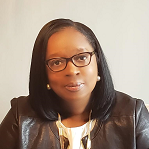
Joanne Isaac
Manager, Community and Labour Market, Toronto Employment and Social Services, City of Toronto
Joanne Isaac is a Manager, Community and Labour Market at Toronto Employment and Social Services (TESS) with the City of Toronto. Joanne has worked in social services for several years and has extensive experience in the areas of mental health and social supports, workforce development and community engagement.
In her current capacity as the Indigenous Lead for TESS and working under the guidance of Indigenous People, Joanne's work is focused on strengthening TESS's relationships with its Indigenous communities, ensuring the delivery of Indigenous cultural competency training for all staff within the division, and re-affirming TESS's commitments to advancing truth and reconciliation. Joanne also works collaboratively with the City of Toronto's Indigenous Affairs Office and Indigenous leaders including the Toronto Aboriginal Support Services Council (TASSC) to establish strategic and thoughtful approaches to meeting these commitments.
This past June, Joanne led TESS's first speaker series for Indigenous Peoples month, launched TESS's first Indigenous Affairs Staff Committee, and recently hosted an all staff event in commemoration of the National Day for Truth and Reconciliation. She is currently working in partnership with 2spirits of the First Nations on an Indigenous Harm Reduction Project.
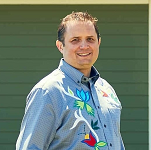
Justin Marchand
Chief Executive Officer, Ontario Aboriginal Housing Services
Justin is Métis and was appointed Chief Executive Officer (CEO) of Ontario Aboriginal Housing Services (OAHS) in 2018. Prior to that, he held the titles of Director of Corporate Operations and Programs Delivery Manager and has been with OAHS since 2009. Justin has 20 years of progressive experience in a broad range of sectors including two publicly listed corporations, a large accounting and consulting firm, and a major crown corporation, and holds numerous designations across financial, operations, and housing disciplines.
He was most recently selected as Chair of the Canadian Housing and Renewal Association’s (CHRA’s) Indigenous Caucus Working Group and is also board member for CHRA. Justin is also an active board member for both the Coalition of Hamilton Indigenous Leadership (CHIL) as well as Shingwauk Kinoomaage Gamig, located in Bawaating.
Justin believes that Housing is a fundamental human right and that when Indigenous people have access to safe, affordable, and culture-based Housing this provides the opportunity to improve other areas of their life.

Tobie Mathew
Program Manager, Toronto Early Learning and Childcare Services, City of Toronto
During the course of her 25-year career, Tobie has led a variety of initiatives creating a significant impact in advancing the work of equity and inclusion. She has held roles internationally and within provincial and municipal governments working in rural communes in Vietnam, in rural Alberta supporting Indigenous communities, and more recently at Toronto Public Health and Toronto Children's Services. Currently, Tobie oversees the management of directly operated childcare in Scarborough that serves over 400 diverse families and their children.Keith McCrady
Executive Director, 2-Spirited People of the 1st Nations
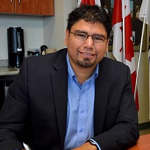
Micheal Miller
Executive Director, Association of Native Child and Family Services Agencies of Ontario
Micheal Miller is an Oji-Cree from Mattagami First Nation in Treaty 9 territory. His 25-year career has focused on the social development of indigenous communities. He has served as the Executive Director at Aboriginal Legal Services (ALS) in Toronto. Prior to joining ALS, he served as the Housing Director for the Cochrane District Social Services Administrative Board, and he played a critical role in opening the Living Space homeless shelter in Timmins. He also served as the Executive Director at Kunuwanimano Child and Family Services and led the agency to become a mandated Children’s Aid Society. He also spent the early part of his career in the Employment and Training field. Micheal holds a Master of Business Administration.Gertie Mai Muise
Executive Director, Ontario Federation of Indigenous Friendship Centres

Benjamin Murray
Co-Founder, Earthling Art Collective
Benjamin ’Planbstrik9‘ Murray - a multidisciplinary artist, producer, facilitator, mentor and director who comes from a background of both settler and Indigenous heritage. Their family on Turtle Island comes from Sipekne'katik first nation; Mi‘kmaw tribe, a part of the Wabanaki confederacy. Their work as a facilitator of creative and therapeutic programs in Indigenous communities led them to solely found Earthling Art Collective in 2016 in an attempt to fill in holes in existing social networks within the creative and therapeutic community. Continuing this work into 2021, Benjamin is now the Co-director of Giinawind collective space, an Indigenous-led space that features a tattoo parlour, an art gallery, a workshop space, as well as a full multimedia production studio open to the public. Benjamin is also a creative consultant and producer for AGENCY, a systems change coalition led by BIPOC young leaders seeking to resolve existing issues in granting services as well as issues facing BIPOC creatives in all sectors. 
Trish Nadjiwon Meekins, MSW RSW CYW CCH
Cross-cultural Educator, Human Resources Consultant, Social Worker
Trish is a registered social worker and holds a Master’s in Social Work in the Indigenous Field of Study. Trish uses various methods of healing such as energy healing and hypnotherapy to assist people with bringing all 4 parts of self together, so that we may roll with the ebbs and flows of life, with a newfound perspective that can be practiced daily. Trish currently has her own practice as a wholistic therapist, as well as a trainer in Indigenous cultural awareness. She is a teacher, trainer, facilitator, and mediator. Most recently, Trish has completed her Human Resources certificate from York University and uses her wholistic approach as well as policy to assist organizations with running their business/programs effectively.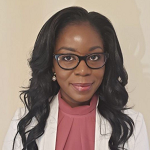
Suzanne Obiorah
Director, Gender and Race Equity, Inclusion, Indigenous Relations and Social Development, City of Ottawa
Suzanne Obiorah is the Director for the new Gender and Race Equity, Inclusion, Indigenous Relations, and Social Development Service at the City of Ottawa. She has worked in health and social services for 19 years. Her work has focused on leading health equity initiatives, creating a low barrier culturally competent programs, advocacy for a regional mental health strategy to support Black residents in Ottawa and planning for the integration of equity frameworks tied to accountability.
In her role at the City, she‘s responsible for the Indigenous Relations portfolio, where she is guided by Indigenous Relations Staff and the Ottawa Aboriginal Coalition to address priorities they‘ve identified will contribute towards Ottawa being a welcoming place for Indigenous Peoples.
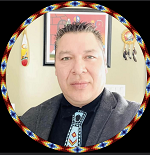
Tim Ominika
Community Based Researcher, Thunderbird Partnership Foundation
Aanii, my name is Tim Ominika, I am from Wiikwemkoong Unceeded Territory – Located on Manitoulin Island Ontario, my Aanishnaabe name is Msko-Ngik (Red Otter) and Ma-iigan Doodem(the Wolf Clan). I am also an elected official in our community serving my Fourth Term. I practice our cultural and traditions in which I carry a strong sense of self, family focus in which is reflected in my morals values and beliefs.
I have been working in the area of Opioid Dependency and Harm Reduction for the past 11 years, I currently working with Thunderbird Partnership Foundation, where I hold the position Community Based Researcher assisting with a National Research Project.
I graduated from Police Foundation 2001, Received BA in Law and Justice 2004.
In 2012 I received Harm Reduction certificate from York University, 2011 I received Opioid Dependency Treatment Certificate from University Of Toronto.
I also sit on CAMH Opioid Internal Network Advisory Committee – and was a part of developing Making the Choice, Making it Work Treatment for Opioid Addiction, Methadone Maintenance Client Hand Book, I also was on the Indigenous Engagement Advisory Committee with Sudbury District Health Unit.
I believe that it does not take one organization to assist in one‘s wellness but it takes a whole community.
Sarah Stevenson
Director, Integrated Social Services, Kenora District Services Board
Sarah Stevenson is the Director of Integrated Social Services with the Kenora District Service Board. Sarah oversees a team that is responsible for the delivery of employment and social assistance programs, child care and early years programs and housing and homelessness programs in the Municipalities of the Kenora District. The Kenora District encompasses Treaty Areas 3, 5 and 9, 47 First Nation Communities, 9 Municipalities and 4 Unincorporated Areas. KDSB’s partnerships are different in every community as no community is alike. KDSB has developed partnerships with Indigenous Friendship Centres, Ontario Native Women’s Association affiliates, Metis Nation of Ontario affiliates, Indigenous Health Authorities, Tribal Councils, Chiefs Advisory Councils, First Nation Communities and Ontario Aboriginal Housing Services. In 2016, KDSB through Board Resolution formally accepted the Truth and Reconciliation Commission of Canada: Calls to Action. Sarah is a second generation, survivor of the McIntosh Residential School legacy. She brings life experience to her leadership role within KDSB.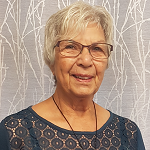
Elder Ada Tinney
Elder, North Hastings Children's Services
Ada Tinney is an Elder of the Kijicho Manito Madaouskarini Algonquin First Nation and belongs to the Martin Clan.
Ada worked as a public school secretary for 27 years before retiring in 1995. Ada is well known in the North Hastings area as an Elder and teacher of Algonquin culture. Ada has shared Algonquin stories and teachings with many children in schools throughout the North Hastings and surrounding area and has also taught drum making. Ada‘s long history of teaching the North Hastings community about Algonquin culture has played a key role in the creation of the Algonquin Inòdewiziwin EarlyON Child and Family Centre and the partnership model with North Hastings Children‘s Services.
Ada continues to have a presence as an Algonquin Elder in all the North Hastings Children‘s Services programs for children, youth and families. She builds and maintains positive relationships with Indigenous Elders and Knowledge keepers from various communities across Canada. In 2017 she received a Canada 150 Award for Service to County and Community. She is a member of the Elders Circle Committee of Kijicho Manito Madaouskarini Algonquin First Nation and she serves on the Public School Board Indigenous Education Committee and the ODEY Algonquin Women‘s Business Network Advisory Group. She is a member of the Shawashkong Ikwe Singers and Drummers and is an artist that works with a wide variety of mediums.
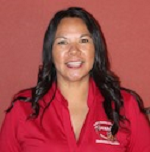
Staci Williams
Training Associate Manager, Ontario Native Welfare Administrators Association
Staci has been involved in Social Services for over 20 years. Prior to joining ONWAA, she was a First Nation Ontario Works Administrator for 10 years. Staci joined ONWAA in 2008 and has been coordinating and delivering culturally appropriate training, support and resources to the First Nations. Staci is the lead for training development and delivery. Staci’s flair for networking and her endearing nature have made her a recognizable and in-demand facilitator across the province, and more recently, facilitating sessions across Canada. Staci is a proud member of Migisi Sahgaigan located in Treaty 3 Territory.
Henry Wall
OMSSA Vice President and Chief Administrative Officer, Kenora District Services Board
Having served as a member of OMSSA’s Board of Directors for the past four years, the last two as Treasurer, Henry was named OMSSA Vice President in 2021.
Henry has been the Chief Administrative Officer of the Kenora District Services Board (KDSB) since November 2014. He started his Public Sector career in Northern Ontario nearly ten years ago. Prior to joining the KDSB, Henry worked as the Treasurer for the Municipality of Sioux Lookout for nearly seven and half years. Henry is focused and has worked hard to bringing stability to the delivery of Housing, Human Services and Emergency Services in the Kenora District. During his term, KDSB has become a fully integrated organization that is focused on providing full wrap around services and supports for families; the organization has grown from being a Service Manager and housing provider of safe affordable housing to administrating Emergency Homeless Shelters, and developing Supportive and Transitional housing.
Henry’s leadership philosophy is simple: with strong vision, collective-forward thinking and engaged employees, any organization can achieve great things.

